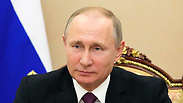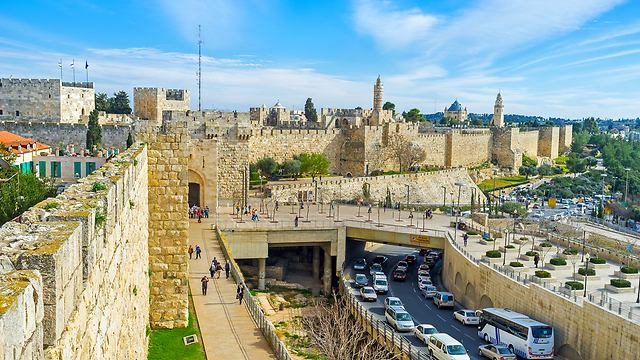
If Russia recognizes Jerusalem, why can’t other countries do so?
Op-ed: Instead of turning Putin’s official recognition of west Jerusalem as Israel’s capital into a major PR campaign that could lead to a tremendous achievement for Israel, the Foreign Ministry is struck with paralysis, petrified by the thought of a Palestinian state with east Jerusalem as its capital.
Granted, it’s only a recognition of the western part of the city, alongside a statement that the eastern part of the city will be the capital of the Palestinian state when that state is established, but still, the statement as is stands as a significant development, and also a surprising one, in light of the identity of the country making the statement (Russia) and a rare diplomatic opportunity to receive similar recognition from many other countries. In a normal country, the Israeli Foreign Ministry would have turned this statement into a major PR campaign.

How was the statement born? Yaakov Kedmi (Yasha Kazakov), the first aliyah activist who had no family in Israel and received a permit to immigrate from the USSR after a stubborn battle, served in the army (in Ehud Barak’s tank in the October 1973 war) and joined the Nativ Secret Liaison Bureau—the Israeli intelligence agency which worked for the Jews of the Soviet bloc—before becoming its chief.
Kedmi was later accused by the Russian intelligence of operating agents in Moscow. He was declared persona non-grata until December 2015, when the Russian ambassador to Israel called him and informed him that the ban had been lifted. Since then, he has been a welcome guest in Moscow, and a series of conversations I held with him in recent months left me with the impression that he has a lot of appreciation for President Vladimir Putin and for the change he has led in Russia. Today, Kedmi is a regular commentator on Russian television and has an influence in the government corridors. He used his ties in the Russian foreign ministry to lead the Jerusalem recognition move.
The international recognition of Jerusalem as Israel’s capital has been very limited. After the 1948 War of Independence, and because the city was supposed to be placed under international regime (“corpus separatum”) according to the 1947 United Nations Partition Plan, not a single country recognized Jerusalem as Israel’s capital (despite recognizing Israel itself).
The United States, for example, has a consulate in Jerusalem, but it is not subject to the embassy operating from Tel Aviv. A law passed by Congress in 1995 states that the US must recognize Jerusalem as Israel’s capital and move its embassy there, but that has not been done. All US presidents have claimed the presidential waiver every six months, and President Donald Trump is about to do the same at the end of this month.
After the victory of the Six-Day War, following the enthusiasm over the State of Israel, and as importantly, thanks to the arms supply and military guidance they received from Israel, several embassies—mostly embassies belonging to African, Asian and some South American countries—relocated to Jerusalem, only to return to Tel Aviv a few years later (the last ones left Jerusalem in 2006).
Kedmi presented a rhetorical question to senior foreign ministry officials in Moscow: If Russia insists that Palestine’s capital should be in east Jerusalem, why should it have a problem recognizing west Jerusalem as Israel’s capital? The simple argument left Foreign Minister Sergey Lavrov’s assistants surprised and with claims that “it’s very complicated.” Kedmi insisted, and the issue was eventually brought to the attention of Lavrov himself, who presented it to President Putin, who signed the declaration.
It’s premature, of course, to talk about moving the Russian embassy to Jerusalem, especially in the absence of a similar embassy in the capital of Palestine, a state which does not exist, for now at least. On the other hand, if Russia, which is not the closest country to Israel, has recognized Jerusalem as its capital, why won’t other countries do it? The actual recognition, actually putting it on paper, even without physically moving the diplomatic corpus real estate, could be a tremendous achievement for Israel.
But instead of enthusiasm, the Foreign Ministry was struck with paralysis. Why? Because any preoccupation with Jerusalem, which includes the fear of the actual thought of a Palestinian state, is so sensitive that it petrifies every Israeli government worker. And so, like in many other cases, like in the undemocratic fight the Israeli government is conducting against human rights organizations, like in the crawling implementation of the Israeli law in the occupied territories, and like the Right’s attempt to fight for its values in an aggressive manner, it leads to the opposite outcome and inflicts heavy international damage on Israel.
Ronen Bergman, a senior correspondent for military and intelligence affairs at Yedioth Ahronoth and a contributing writer for the New York Times, is the author of the forthcoming “Rise and Kill First: The Secret History of Israel’s Targeted Assassinations.”










